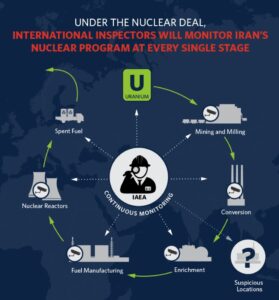
As btw reported back in April, many countries have viewed Iran’s nuclear ambitions as a considerable threat. In 2006, a diplomatic group made up of six world powers calling themselves P5+1 (named for the five permanent members of the United Nations Security Council plus one non-member), gathered together to strategize on the best way to negotiate with Iran.

After rounds of talks, the countries–the United States, the United Kingdom, Russia, France, China, plus Germany, sometimes called the P5+1–reached an interim (temporary) agreement in 2013 called the Joint Plan of Action (JPA). It was due to expire on July 31 of this year. Using a framework developed in April, the P5+1, along with members of the European Union, negotiated with Iran to create a permanent agreement, called the Joint Comprehensive Plan of Action. The details of the deal can be found here.
In order for it to become official, the Joint Comprehensive Plan of Action must be approved by Congress within sixty days. While legislators go about debating the pros and cons, we put the question to you. Is the Iran deal good for the United States?
Yes
- Before these negotiations, Iran had not engaged in any meaningful contact with its foes for three decades. Having spent the last nearly two years at the negotiating table is a hopeful sign. This is an extension of Obama’s reliance on diplomacy in foreign affairs. The next generation of Iranians are more interested in the freedoms allowed by the lifting of sanctions than terrorism.
- While developed thorough diplomacy, the leaders who made this deal insist it is built on verification, not trust. Inspectors will have unprecedented 24/7 access to Iran’s key nuclear facilities, entire supply chain, uranium mines, mills, conversion facilities, its centrifuge manufacturing and storage facilities, as well as any suspicious location. These transparent efforts ensure that Iran will not be able to divert materials from known facilities to covert ones.
- Economic sanctions, which include cutting off Iran’s access to global banking systems and severely limiting its oil revenue, have been very effective. The country now has a clear incentive to abide by future. Iran must complete key nuclear steps before it receives any relief from sanctions. For the next decade, Iran must abide before any further sanctions are lifted. If there is any violation, all sanctions will snap back. Clear consequences for violation.
No
- Iran has a terrible reputation for not doing what it’s supposed to. Some believe that the country does not deserve the concessions the deal is allowing. Former Secretary of State Henry Kissinger recently said that the plan does appropriately address “three-and-a-half decades of militant hostility to the West.” President Obama, in the final years of his presidency without an election to win, will not have to deal the effects of a failed agreement.
- This action will only delay the inevitability of Iran obtaining nuclear weapons that it will use against its many enemies. An emboldened Iran, especially, will cause harm. Both Israel and Saudi Arabia (major foes of Iran) see this deal as a threat. Israeli Prime Minister Benjamin Netanyahu called the deal, “a historic mistake.” This could harm our relations with those countries.
- Without its nuclear program, and a return of its financial means, Iran is likely turn its attention to other conflicts in the region, including support of Syrian President Bashar al-Assad. With the increase in revenue created by the lifting of sanctions, Iran could regain the financial means to return to its old ways.
Related Links
Learn more about the specific details of the nuclear deal negotiated by the Obama Administration, click here.
